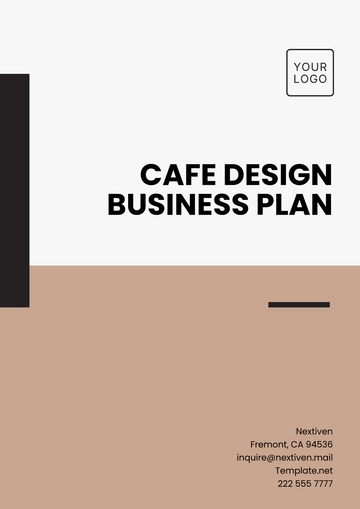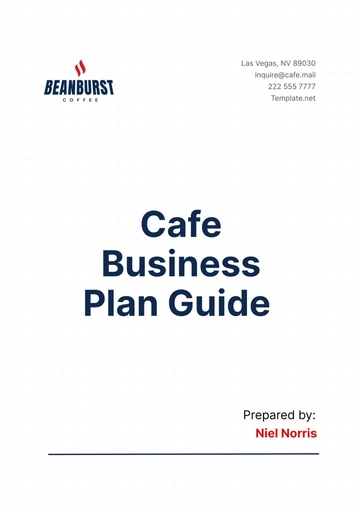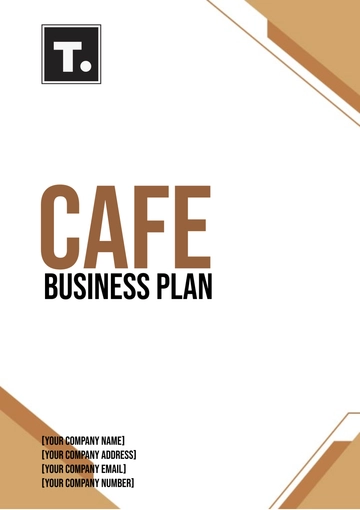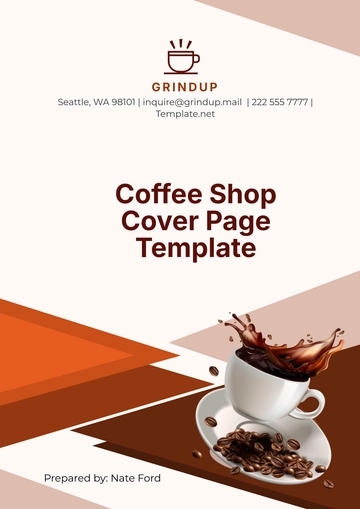Free Cafe Business Plan Guide
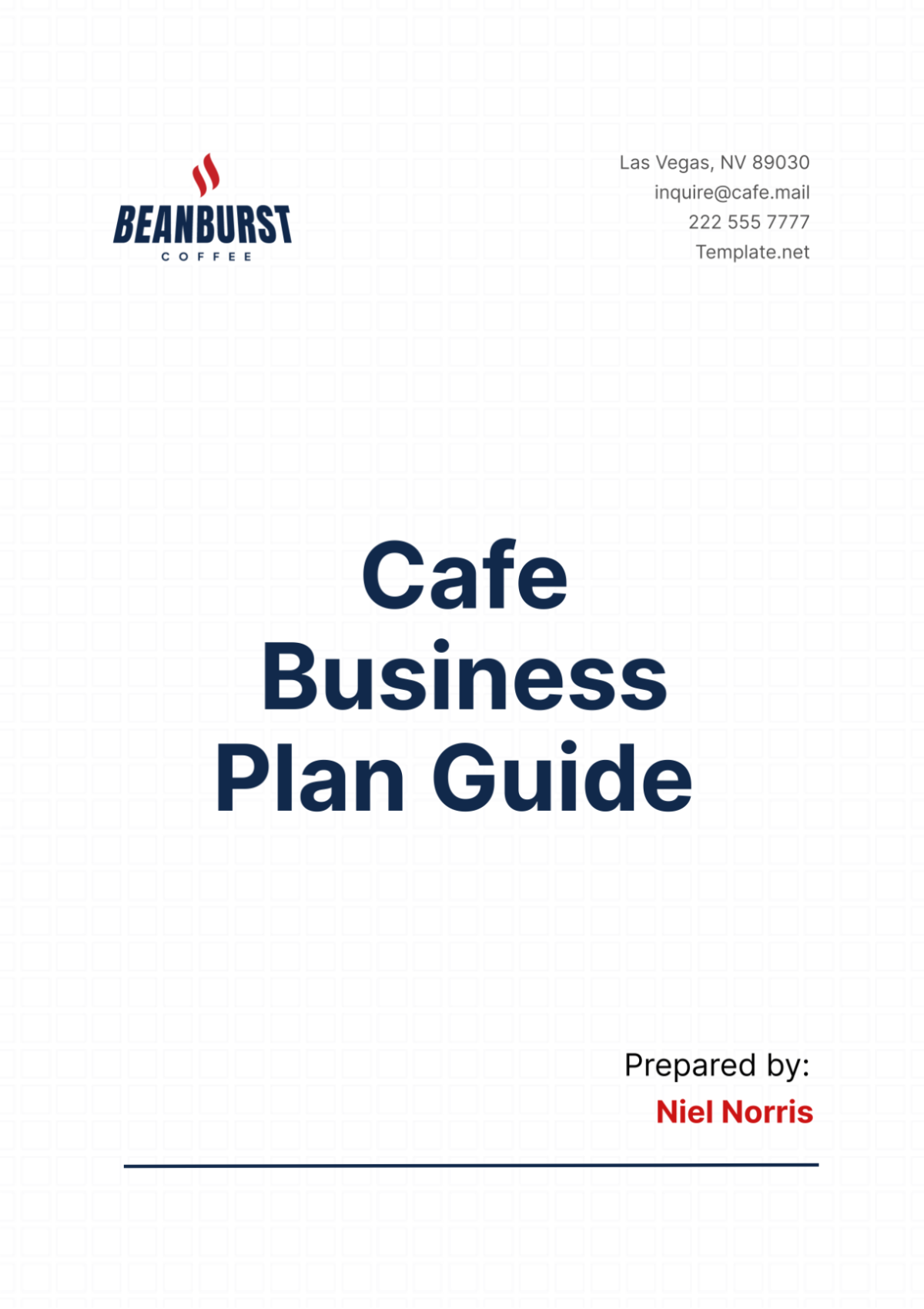
I. Executive Summary
A. Purpose of This Business Guide
The purpose of this Cafe Business Plan Guide is to provide a comprehensive roadmap for establishing and operating [Your Company Name]. This guide outlines the strategic, operational, and financial planning necessary to ensure the cafe's success. By detailing our vision, market analysis, product offerings, management structure, and marketing strategies, we aim to create a robust framework that supports our mission of delivering exceptional coffee and food experiences to our customers. This business plan will serve as a valuable resource for internal planning and as a persuasive document for securing funding and partnerships.
B. Business Overview
[Your Company Name] is a contemporary cafe dedicated to providing a unique and memorable experience for coffee enthusiasts and casual diners alike. Located in the heart of [City], our cafe combines a cozy atmosphere with an innovative menu featuring high-quality coffee, artisanal pastries, and gourmet sandwiches. Our mission is to become the go-to destination for individuals seeking a relaxing environment to enjoy exceptional coffee and food.
Our vision is to expand our brand and establish a chain of cafes that are synonymous with quality, community, and sustainability. We aim to be a leader in the cafe industry by consistently delivering superior products and services, fostering a loyal customer base, and contributing positively to our community and the environment.
C. Business Objectives
In the short term, [Your Company Name] aims to achieve the following objectives:
Successfully launched the cafe and established a strong local presence within the first year.
Attract and retain a loyal customer base through exceptional service and quality products.
Generate a monthly revenue of $20,000 by the end of the first year of operation.
Our long-term objectives include:
Expanding to three additional locations within five years.
Achieving an annual revenue of $500,000 by the end of the fifth year.
Implementing sustainable practices across all operations to minimize our environmental impact.
D. Market Opportunity
The cafe industry is experiencing significant growth, driven by the increasing popularity of specialty coffee and the growing demand for unique dining experiences. Our target market includes young professionals, students, and coffee aficionados who value quality, convenience, and a welcoming atmosphere. [Your Company Name] will capitalize on this opportunity by offering a diverse menu, exceptional customer service, and a distinctive ambiance that sets us apart from competitors.
E. Financial Highlights
Our financial projections indicate that [Your Company Name] will achieve profitability within the first year of operation. Key financial metrics include:
Initial investment: $150,000
Projected first-year revenue: $240,000
Projected first-year net profit: $30,000
Break-even point: 8 months
These projections are based on conservative estimates and a thorough analysis of the market and operational costs.
II. Company Description
A. Business Structure
[Your Company Name] will operate as a Limited Liability Company (LLC), providing flexibility in management and limited liability protection for the owners. The ownership and management team consists of [Owner's Name], who brings extensive experience in the hospitality industry, and [Co-owner's Name], who has a strong background in business management and finance. Together, they will oversee all aspects of the cafe's operations, from day-to-day management to strategic planning and growth.
B. Location and Facilities
The cafe will be located at [Your Company Address], a prime spot in [City] known for its high foot traffic and vibrant community. The facility will feature a modern, inviting design with seating for 50 customers. The layout includes a spacious dining area, a barista station, a pastry display counter, and a small outdoor patio for al fresco dining. The interior design will emphasize comfort and style, with warm lighting, comfortable seating, and tasteful decor that reflects our brand's identity.
C. History and Background
[Your Company Name] was founded by [Owner's Name] and [Co-owner's Name], who share a passion for coffee and a vision for creating a unique cafe experience. With years of experience in the hospitality industry, they identified a gap in the market for a cafe that offers not only high-quality coffee and food but also a welcoming atmosphere where customers can relax, work, or socialize. The founders have worked diligently to develop a comprehensive business plan, secure funding, and build a team of skilled professionals to bring their vision to life.
III. Market Analysis
A. Industry Overview
The cafe industry has seen steady growth over the past decade, driven by the increasing popularity of specialty coffee and the rise of coffee culture. According to recent market research, the global coffee market is projected to grow at a CAGR of 4.2% from [Year] to [Year]. The trend towards artisanal and specialty coffee has created a demand for cafes that offer unique, high-quality products and a distinctive experience.
B. Target Market
Our target market consists of young professionals, students, and coffee enthusiasts aged 18-45 who live or work in the [City] area. This demographic values quality, convenience, and a welcoming atmosphere. They are willing to pay a premium for high-quality coffee and food and seek out cafes that offer a unique and enjoyable experience.
Demographic Profile
Age: 18-45
Gender: Both male and female
Income: $30,000 - $100,000 annually
Occupation: Professionals, students, freelancers
Psychographic Profile
Lifestyle: Busy, on-the-go, social
Values: Quality, sustainability, community
Interests: Coffee, food, socializing, working remotely
C. Competitive Analysis
[Your Company Name] faces competition from several established cafes and coffee shops in the [City] area. However, our unique selling proposition (USP) and commitment to quality set us apart from the competition. Key competitors include Competitor 1, Competitor 2, and Competitor 3.
Competitor | Strengths | Weaknesses |
|---|---|---|
Competitor 1 | Well-known brand, loyal customer base | Limited menu, high prices |
Competitor 2 | Convenient location, variety of offerings | Inconsistent quality, average service |
Competitor 3 | Specialty coffee focus, trendy ambiance | Limited seating, long wait times |
D. Market Segmentation
We have identified three primary market segments that [Your Company Name] will target:
Young Professionals: Individuals aged 25-35 who work in the [City] area and seek a convenient and comfortable place to enjoy coffee and food, either alone or with colleagues.
Students: College and university students aged 18-24 who need a place to study, socialize, and grab a quick bite or coffee between classes.
Coffee Enthusiasts: Individuals aged 30-45 who are passionate about specialty coffee and appreciate high-quality, artisanal products.
IV. Marketing and Sales Strategy
A. Marketing Plan
Our marketing plan focuses on building brand awareness and attracting customers through a combination of digital marketing, local advertising, and community engagement.
Branding and Positioning
[Your Company Name] will position itself as a premium cafe that offers high-quality coffee, artisanal pastries, and gourmet sandwiches in a welcoming and stylish environment. Our branding will emphasize quality, community, and sustainability, with a focus on creating a memorable experience for our customers.
Marketing Channels
We will utilize various marketing channels to reach our target audience:
Social Media: Platforms such as Instagram, Facebook, and Twitter will be used to showcase our products, share updates, and engage with customers.
Email Marketing: Regular newsletters will be sent to our subscriber list, featuring promotions, events, and new menu items.
Local Advertising: We will place ads in local newspapers, magazines, and community bulletin boards to reach potential customers in the [City] area.
Influencer Partnerships: Collaborations with local influencers and bloggers will help increase brand visibility and attract new customers.
B. Sales Strategy
Our sales strategy focuses on providing exceptional customer service, creating a seamless and enjoyable customer experience, and implementing effective pricing strategies.
Sales Process and Customer Journey
The customer journey at [Your Company Name] begins with a warm welcome from our friendly staff, followed by a seamless ordering process at the counter. Customers can choose to dine in, take their orders to-go, or enjoy our outdoor seating area. We will implement a loyalty program to reward repeat customers and encourage word-of-mouth referrals.
Pricing Strategy
Our pricing strategy is designed to reflect the quality of our products while remaining competitive within the market. We will offer a range of price points to cater to different customer preferences and budgets, with premium pricing for specialty items and affordable options for everyday menu items.
C. SWOT Analysis
Strengths | Weaknesses |
|---|---|
High-quality products | Limited brand recognition initially |
Prime location | Higher operating costs due to premium ingredients |
Experienced management team | Dependence on local market conditions |
Opportunities | Threats |
|---|---|
Growing demand for specialty coffee | Intense competition from established cafes |
Expansion into new locations | Economic downturn affecting consumer spending |
Increasing focus on sustainability | Fluctuations in coffee bean prices |
V. Operations Plan
A. Cafe Operations
The daily operations at [Your Company Name] will be meticulously planned to ensure efficiency and consistency in service. Our workflow will include specific procedures for opening and closing the cafe, food and beverage preparation, and customer service.
Daily Operations and Workflow
Opening Procedures: Staff will arrive an hour before opening to set up the cafe, prepare ingredients, and ensure all equipment is in working order. The manager will conduct a pre-opening meeting to discuss daily goals and any special events or promotions.
Service Hours: During operating hours, staff will follow a structured workflow to maintain a smooth and efficient service. Baristas will handle coffee preparation, the kitchen staff will manage food orders, and servers will attend to customer needs.
Closing Procedures: At the end of the day, staff will clean and sanitize the cafe, restock supplies, and conduct a final check to ensure everything is in order for the next day.
B. Supplier Relationships
Establishing strong relationships with reliable suppliers is crucial to maintaining the quality of our products. [Your Company Name] will work with local vendors and reputable distributors to source fresh, high-quality ingredients and supplies.
Supplier | Products | Frequency of Delivery |
|---|---|---|
Local Bakery | Artisanal pastries, bread | Daily |
Organic Farm | Fresh produce, dairy | Twice weekly |
Coffee Roaster | Specialty coffee beans | Weekly |
C. Staffing Plan
A well-trained and motivated team is essential to the success of [Your Company Name]. Our staffing plan includes detailed recruitment and training processes to ensure we hire and retain the best talent.
Staffing Requirements
Manager: Oversees daily operations, staff management, and customer service.
Baristas: Prepare coffee and beverages, manage the barista station, and engage with customers.
Kitchen Staff: Prepare food orders, manage kitchen operations, and maintain cleanliness.
Servers: Attend to customer needs, take orders, and deliver food and beverages.
Recruitment and Training
We will implement a rigorous recruitment process to identify candidates with the right skills and attitude. Training programs will cover all aspects of cafe operations, including customer service, food and beverage preparation, and safety protocols. Continuous training and development opportunities will be provided to ensure our team remains motivated and skilled.
D. Roles and Responsibilities
Each team member at [Your Company Name] will have clearly defined roles and responsibilities to ensure efficient operations and a positive customer experience.
Role | Responsibilities |
|---|---|
Manager | Oversee daily operations, manage staff, ensure customer satisfaction |
Barista | Prepare coffee and beverages, maintain barista station, engage with customers |
Kitchen Staff | Prepare food orders, manage kitchen operations, maintain cleanliness |
Server | Attend to customer needs, take orders, deliver food and beverages |
VI. Product Line and Services
A. Menu Description
[Your Company Name] offers a carefully curated menu designed to appeal to a wide range of customers, from casual coffee drinkers to food enthusiasts. Our menu focuses on high-quality, artisanal offerings that showcase the best ingredients and flavors.
Core Menu Items
Our core menu includes a variety of coffee drinks, such as espresso, cappuccino, latte, and cold brew. We source our coffee beans from renowned local roasters to ensure freshness and quality. In addition to coffee, we offer a selection of teas, including black, green, and herbal varieties.
Item | Description | Price |
|---|---|---|
Espresso | Rich and intense shot of espresso made with our signature blend | $3.00 |
Cappuccino | A balanced mix of espresso, steamed milk, and foam | $4.00 |
Latte | Creamy blend of espresso and steamed milk | $4.50 |
Cold Brew | Smooth and refreshing coffee brewed cold for 12 hours | $4.00 |
Black Tea | Classic black tea with a bold flavor | $2.50 |
Green Tea | Light and refreshing green tea | $2.50 |
Herbal Tea | Caffeine-free tea made with a blend of herbs and flowers | $2.50 |
Specialty Items and Seasonal Offerings
To keep our menu exciting and cater to seasonal preferences, we introduce specialty items and limited-time offerings. These include seasonal drinks, such as pumpkin spice lattes in the fall and iced lavender lemonade in the summer, as well as rotating pastries and desserts.
Seasonal Item | Description | Season | Price |
|---|---|---|---|
Pumpkin Spice Latte | Espresso with pumpkin spice syrup, steamed milk, and foam | Fall | $5.00 |
Iced Lavender Lemonade | Refreshing lemonade infused with lavender | Summer | $4.50 |
Gingerbread Cookies | Spiced cookies with a festive design | Winter | $2.00 |
Strawberry Rhubarb Tart | Sweet and tangy tart with fresh strawberries and rhubarb | Spring | $4.00 |
B. Service Offerings
[Your Company Name] provides a range of services designed to enhance the customer experience and meet diverse needs.
Dine-In and Takeout Options
Customers can choose to enjoy their meals and beverages in our comfortable cafe or take them to go. Our takeout packaging is designed to preserve the quality of our products and ensure convenience for our customers.
Catering and Event Services
We offer catering services for corporate events, parties, and other special occasions. Our catering menu includes a selection of coffee and tea, pastries, sandwiches, and desserts, all tailored to suit the event's needs. Additionally, we provide on-site barista services for events, bringing our high-quality coffee experience to our customers.
Customer Experience Enhancements
To create a memorable experience, we provide free Wi-Fi, comfortable seating, and a welcoming ambiance. Our cafe features a mix of communal tables, cozy nooks, and outdoor seating to accommodate different preferences. We also host regular events, such as live music, poetry readings, and coffee-tasting sessions, to engage with our community and attract new customers.
VII. Management and Organization
A. Management Team
The management team at [Your Company Name] consists of experienced professionals with diverse backgrounds in the hospitality and business industries. Their combined expertise ensures that the cafe operates efficiently and meets its strategic goals.
Name | Role | Experience |
|---|---|---|
[Owner's Name] | Founder & CEO | 10+ years in the hospitality industry, specializing in cafe management |
[Co-owner's Name] | COO | 8+ years in business management and finance, with a focus on operational efficiency |
[Manager's Name] | Cafe Manager | 5+ years in cafe operations, skilled in customer service and staff management |
B. Organizational Structure
The organizational structure of [Your Company Name] is designed to facilitate efficient operations and clear communication. The management team oversees all aspects of the business, from strategic planning to daily operations. The cafe manager supervises the staff, including baristas, kitchen staff, and servers, ensuring that everyone works cohesively to deliver exceptional service.
C. HR Policies and Procedures
[Your Company Name] is committed to creating a positive and supportive work environment for our employees. Our HR policies and procedures are designed to ensure fair treatment, professional development, and employee satisfaction.
Employee Handbook Overview
The employee handbook outlines the policies and procedures that govern our workplace. It includes information on attendance, dress code, health and safety, and code of conduct. The handbook also details the benefits and compensation packages available to our employees, including health insurance, paid time off, and performance-based bonuses.
Training and Development Programs
We believe in investing in our employees' growth and development. Our training programs cover all aspects of cafe operations, from customer service and barista skills to food safety and hygiene. New hires undergo an initial training period, followed by ongoing development opportunities, such as advanced barista courses, leadership training, and team-building activities.
VIII. Financial Plan
A. Startup Costs
The startup costs for [Your Company Name] include initial investments in equipment, leasehold improvements, inventory, and working capital. These costs are essential to establish a high-quality cafe that meets our standards and attracts customers.
Expense Category | Amount ($) |
|---|---|
Leasehold Improvements | $50,000 |
Equipment | $40,000 |
Initial Inventory | $10,000 |
Working Capital | $30,000 |
Marketing and Advertising | $10,000 |
Miscellaneous | $10,000 |
Total | $150,000 |
B. Financial Projections
Our financial projections are based on a thorough analysis of the market, our pricing strategy, and expected customer demand. The projections include profit and loss statements, cash flow statements, and balance sheets for the first three years of operation.
Profit and Loss Statements
Our profit and loss statements project steady growth in revenue and profitability as we establish our brand and attract a loyal customer base.
Cash Flow Statements
Our cash flow projections ensure that we maintain sufficient liquidity to cover our operating expenses and invest in growth opportunities.
Balance Sheets
Our balance sheets reflect the financial health of [Your Company Name] and our ability to meet short-term and long-term obligations.
C. Break-even Analysis
The break-even analysis determines the point at which our revenues will cover our costs, allowing us to achieve profitability. Our break-even point is calculated based on fixed and variable costs and projected sales volume.
Metric | Amount ($) |
|---|---|
Fixed Costs | $120,000 |
Variable Costs per Unit | $2.00 |
Average Price per Unit | $5.00 |
Break-even Sales Volume | 40,000 units |
D. Funding Requirements
To cover our startup costs and initial operating expenses, [Your Company Name] requires a total funding of $150,000. This funding will be sourced through a combination of owner investment, bank loans, and potential investors.
Use of Funds
The funds will be allocated as follows:
Leasehold Improvements: $50,000
Equipment: $40,000
Initial Inventory: $10,000
Working Capital: $30,000
Marketing and Advertising: $10,000
Miscellaneous: $10,000
IX. Marketing Strategy
A. Market Analysis
Our market analysis identifies the key trends and factors that will influence the success of [Your Company Name]. We focus on understanding our target market, analyzing competitors, and identifying opportunities for growth.
Target Market
Our target market includes coffee enthusiasts, local residents, office workers, and tourists. We segment our market based on demographics, psychographics, and behaviors to tailor our marketing efforts effectively.
B. Competitive Analysis
Our competitive analysis identifies key competitors in the local market, their strengths and weaknesses, and how we can differentiate ourselves. We focus on offering superior quality, exceptional customer service, and a unique ambiance to stand out from the competition.
C. Marketing Plan
Our marketing plan outlines the strategies and tactics we will use to attract and retain customers. This includes a mix of online and offline marketing efforts.
Online Marketing
We will leverage digital marketing channels to reach our target audience effectively.
Website: Our user-friendly website will provide information about our menu, services, and events. It will also include an online ordering system for takeout and catering.
Social Media: We will use social media platforms like Instagram, Facebook, and Twitter to engage with customers, share updates, and promote special offers. High-quality photos and videos will showcase our products and ambiance.
Email Marketing: A monthly newsletter will keep our customers informed about new menu items, upcoming events, and exclusive promotions.
Offline Marketing
Traditional marketing methods will complement our online efforts and help us reach a broader audience.
Local Advertising: We will advertise in local newspapers, magazines, and community bulletins to increase our visibility.
Events and Sponsorships: Hosting events such as live music nights, coffee tastings, and art exhibitions will attract new customers and build community relationships. We will also sponsor local events to increase our brand presence.
Loyalty Program: A loyalty program will reward repeat customers with discounts and special offers, encouraging them to return frequently.
D. Sales Strategy
Our sales strategy focuses on providing exceptional customer service, upselling, and cross-selling to maximize revenue.
Customer Service: Training staff to provide personalized and attentive service will enhance the customer experience and encourage repeat visits.
Upselling: Staff will be trained to suggest higher-margin items and add-ons, such as pastries with coffee orders or premium drink options.
Cross-selling: Promoting complementary products, such as pairing a sandwich with a drink, will increase average transaction values.
By implementing these strategies, [Your Company Name] aims to establish itself as a leading cafe in the area, attract a loyal customer base, and achieve sustainable growth.
X. Conclusion
The Cafe Business Plan Guide for [Your Company Name] provides a detailed roadmap for establishing and operating a successful cafe. The guide covers key aspects of the business, including market analysis, product offerings, management structure, and marketing strategies. By following this guide, [Your Company Name] aims to deliver exceptional coffee and food experiences to its customers and achieve sustainable growth in the competitive cafe industry.
The guide outlines a comprehensive approach to business planning, including:
Market Analysis: Identifying target markets, analyzing competitors, and understanding industry trends.
Product Line and Services: Offering a curated menu of high-quality coffee drinks, teas, and seasonal specialties.
Management and Organization: Establishing a strong management team and organizational structure to ensure efficient operations.
Financial Plan: Detailing startup costs, financial projections, and funding requirements.
Marketing Strategy: Implementing online and offline marketing tactics to attract and retain customers.
- 100% Customizable, free editor
- Access 1 Million+ Templates, photo’s & graphics
- Download or share as a template
- Click and replace photos, graphics, text, backgrounds
- Resize, crop, AI write & more
- Access advanced editor
Strategize effectively with Template.net's Cafe Business Plan Guide Template. This customizable and editable template, accessible via the Ai Editor Tool, helps you draft comprehensive business plans. Personalize it to include specific goals and strategies. Ensure clear and organized documentation to support successful business planning in your cafe.
You may also like
- One Page Business Plan
- Coffee Shop Business Plan
- Restaurant Business Plan
- Food Business Plan
- Real Estate Business Plan
- Executive Summary Business Plan
- Cover Page Business Plan
- Nonprofit Business Plan
- Daycare Business Plan
- Construction Business Plan
- Startup Business Plan
- Medical Business Plan
- Bakery Business Plan
- Service Plan
- Hotel Business Plan
- Catering Business Plan
- School Business Plan
- Healthcare Business Plan
- Transportation Plan
- Sports Plan
- Car Wash Business Plan
- Salon Business Plan
- Clothing Business Plan
- Farming Business Plan
- Boutique Plan
